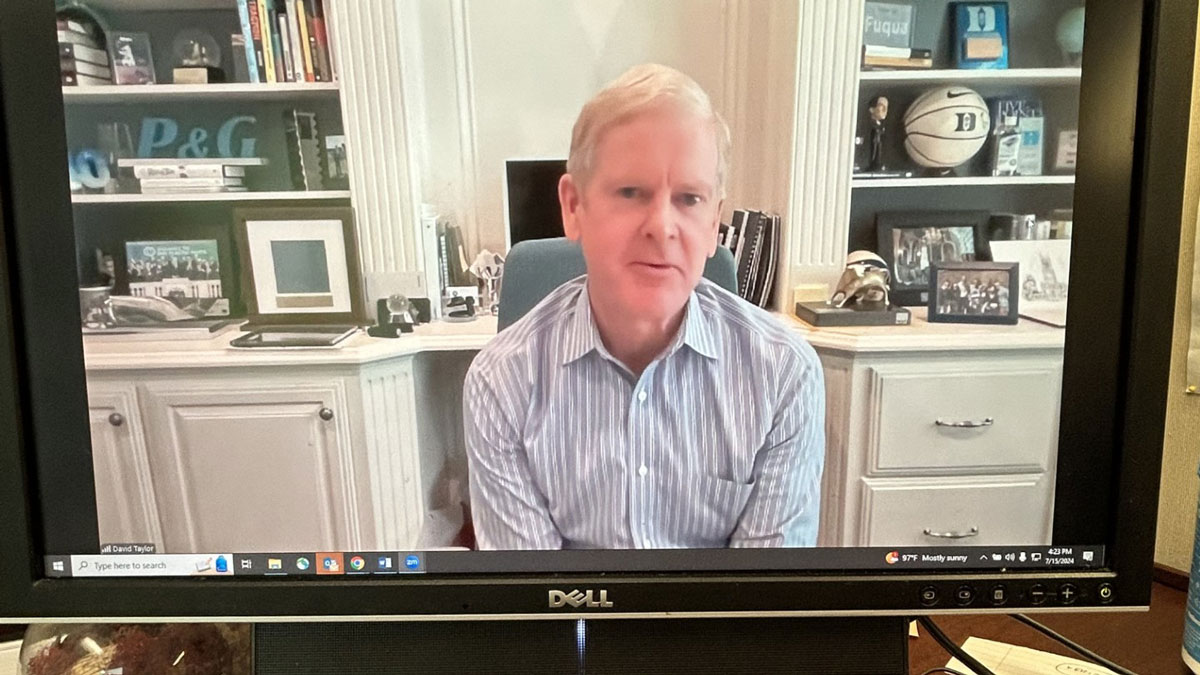David Taylor, Duke ’80 and former CEO of Procter & Gamble, was a featured speaker on the Zoom-based Civility Call series, a joint effort by Fuqua, SHRM and the Page Society.
The Civility Call
The Civility Call provides a vital forum for senior HR and communications leaders to share best practices on managing workplace tensions during polarized times. Convened in partnership with SHRM and the Page Society, these monthly discussions provide expert insights and best practices from participants organizations. Each month, executives engage in candid dialogue after expert-led discussions on pressing topics like navigating political discourse, customer relationships across divides, and supporting employee wellbeing. This open sharing of strategies and experiences is critical, as businesses face escalating civility risks that can disrupt operations and damage reputations amid the intensifying 2024 election cycle.
As the 2024 U.S. presidential election approaches, business leaders find themselves in an increasingly precarious position. With public trust in institutions waning, and with research suggesting business is highly trusted, companies are being called upon to champion democratic norms and free elections. But can they do so without being seen as engaging in politics?
This was the central question posed during a recent Civility Call hosted by Duke University’s Dialogue Project, in collaboration with SHRM and the Page Society.
For David Taylor, former CEO of Procter & Gamble, the answer lies in a careful decision-making framework. “First, I think of principles and values,” Taylor explained. “That is the first filter; any action must be consistent with a company’s values. Secondly, we must ask what the impact will be on our company and our people.”
Taylor emphasized the importance of focusing on issues directly relevant to the business and its stakeholders. He advocated for a measured approach, suggesting that internal communication often proves more effective than external statements on broad societal issues.
“Externally, there will likely be only a few areas where we’re going to put meaningful effort,” Taylor said. “We want to focus and have real impact.”
Luke Hartig, co-founder of Gravity Research, provided data-driven insights into the challenges companies face. His research indicates that employee pressure is the primary driver for corporate engagement on societal issues.
“Sixty-four percent of executives said that they expected to feel substantially more pressure from employees this cycle than they did last time around,” Hartig reported.
To navigate these waters, Hartig advocated for robust scenario planning. “For this to be meaningful, you have to engage the top executives in the company and they have to work through this,” he explained. By anticipating potential election-related challenges, companies can develop more nuanced and effective response strategies.
Both Taylor and Hartig highlighted the potential power of collective action. Taylor suggested that statements from organizations like the Business Roundtable could carry more weight than individual company declarations on issues like democratic norms.
As the conversation unfolded, it became clear that there’s no one-size-fits-all approach. Companies must weigh their unique circumstances, stakeholder expectations, and potential impacts when deciding whether and how to engage on democracy-related issues.
As businesses grapple with these complex decisions, the insights shared during the Civility Call offered a roadmap for thoughtful engagement. By focusing on core values, prioritizing internal dialogue, and considering collective action, companies can navigate the delicate balance between corporate responsibility and political neutrality.
The challenge for business leaders is clear: how to leverage their trusted position in society to support democratic norms, while staying true to their corporate mission and values. As the election approaches, all eyes will be on how they rise to meet this challenge.

